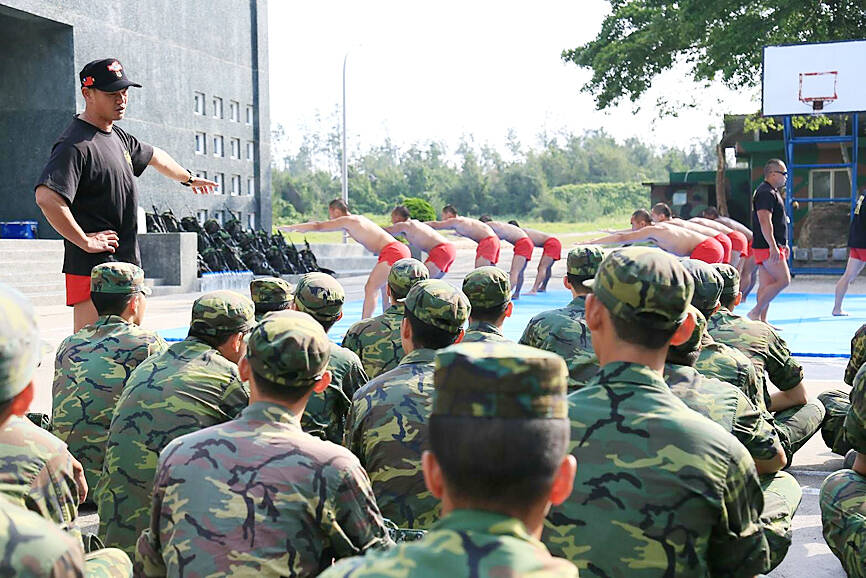The Ministry of National Defense (MND) on Wednesday relaxed physical standards for new recruits and amended the salaries of volunteer soldiers to boost recruitment numbers.
The amendments targeting articles 4 and 8 of the Volunteer Soldier Selection and Training Act (志願士兵選訓實施辦法) relaxed the height and body mass index (BMI) requirements, and adjusted the base pay and other standards for volunteer soldiers to match those of privates in the army.
The ministry said it made the changes after referencing volunteer requirements in the US and Japan.

Photo: CNA
The height range requirement for male recruits was changed from between 160cm and 195cm to between 152cm and 200cm, while that for female recruits was changed from between 155cm and 185cm to between 150cm and 200cm, the ministry said.
The BMI range for men, which used to be between 17 and 31, was changed to between 16.5 and 32, while the requirement for women remains the same at between 17 and 26.
The restriction on having a foot arch larger than 168 degrees has been removed, allowing those previously considered flatfooted to also be eligible for service.
Male recruits must have a hemoglobin count of at least 13 grams per deciliter (g/dL) and female recruits 12g/dL, compared with previous limits of 12g/dL and 11.5g/dL respectively.
The restrictions on hemoglobin count aim to bar anemic people from military service.
The changes were made to take the WHO’s definition of anemia into consideration, the ministry said.
The new rules also relax eyesight requirements for joining the military police.
Previously, recruits needed to have 20/25 vision, or if they are wearing glasses, both eyes must be within negative-6 diopters, the ministry said.
The relaxation of vision requirements was due to an increase in the number of people with myopia, it said.
The height requirement of between 160cm and 195cm for men was left unchanged for military police, while the minimum female height requirement was reduced from 156cm to 155cm, retaining the maximum height of 185cm, the amendments say.
Additional reporting by CNA

Taiwan is projected to lose a working-age population of about 6.67 million people in two waves of retirement in the coming years, as the nation confronts accelerating demographic decline and a shortage of younger workers to take their place, the Ministry of the Interior said. Taiwan experienced its largest baby boom between 1958 and 1966, when the population grew by 3.78 million, followed by a second surge of 2.89 million between 1976 and 1982, ministry data showed. In 2023, the first of those baby boom generations — those born in the late 1950s and early 1960s — began to enter retirement, triggering

ECONOMIC BOOST: Should the more than 23 million people eligible for the NT$10,000 handouts spend them the same way as in 2023, GDP could rise 0.5 percent, an official said Universal cash handouts of NT$10,000 (US$330) are to be disbursed late next month at the earliest — including to permanent residents and foreign residents married to Taiwanese — pending legislative approval, the Ministry of Finance said yesterday. The Executive Yuan yesterday approved the Special Act for Strengthening Economic, Social and National Security Resilience in Response to International Circumstances (因應國際情勢強化經濟社會及民生國安韌性特別條例). The NT$550 billion special budget includes NT$236 billion for the cash handouts, plus an additional NT$20 billion set aside as reserve funds, expected to be used to support industries. Handouts might begin one month after the bill is promulgated and would be completed within

The National Development Council (NDC) yesterday unveiled details of new regulations that ease restrictions on foreigners working or living in Taiwan, as part of a bid to attract skilled workers from abroad. The regulations, which could go into effect in the first quarter of next year, stem from amendments to the Act for the Recruitment and Employment of Foreign Professionals (外國專業人才延攬及僱用法) passed by lawmakers on Aug. 29. Students categorized as “overseas compatriots” would be allowed to stay and work in Taiwan in the two years after their graduation without obtaining additional permits, doing away with the evaluation process that is currently required,

IMPORTANT BACKER: China seeks to expel US influence from the Indo-Pacific region and supplant Washington as the global leader, MAC Minister Chiu Chui-cheng said China is preparing for war to seize Taiwan, Mainland Affairs Council (MAC) Minister Chiu Chui-cheng (邱垂正) said in Washington on Friday, warning that Taiwan’s fall would trigger a regional “domino effect” endangering US security. In a speech titled “Maintaining the Peaceful and Stable Status Quo Across the Taiwan Strait is in Line with the Shared Interests of Taiwan and the United States,” Chiu said Taiwan’s strategic importance is “closely tied” to US interests. Geopolitically, Taiwan sits in a “core position” in the first island chain — an arc stretching from Japan, through Taiwan and the Philippines, to Borneo, which is shared by